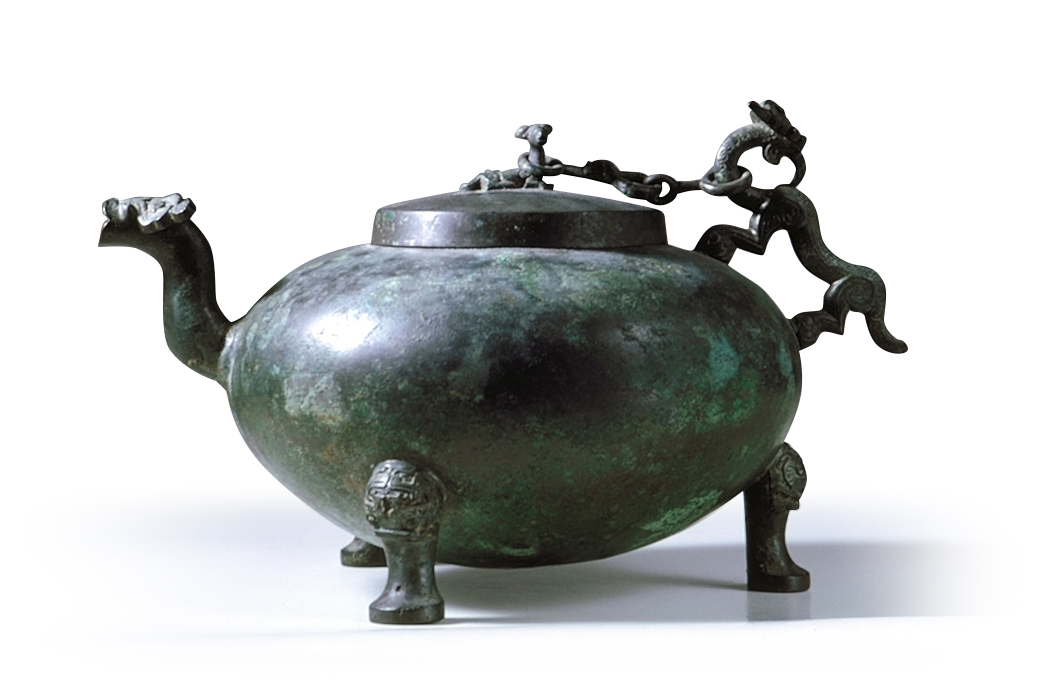
Arts of Asia Spring 2022 Gifts of Rivers and Resources: Art and Power in Ancient Asia
Late registration is now closed.
Arts of Asia lectures return to Samsung Hall starting March 4, 2022. Lectures will be broadcast simultaneously on Zoom. Read details here.
The artistic productions of a society are a function of the society's geography, climate, environmental conditions, natural resources, technology, trade, and culture. This series examines the foundations of Asian artistic traditions with attention to how their natural environments shaped the cultures. It is no accident that complex cultures first arose on rivers, near fertile croplands, close to deposits of valuable minerals, or at nodes of trade routes. Join us for a journey across ancient Asia to see how the formative traditions arose from their natural settings. This series will explore the ancient societies that arose along the great river systems of the Indus, Tigris and Euphrates, Oxus, Yellow River, Yangtze, Ganges, and Mekong, and survey the earliest complex cultures of Mesopotamia, Iran, Central Asia, India, the Himalayas, China, Southeast Asia, Korea, and Japan.
Speakers & Topics (Subject to Change)
January 28, 2022 Zoom Webinar Only
The Indus Tradition of Ancient South Asia: New Perspectives on Crafts, Trade, Ideology and Power Study Guide
Article 1 Article 2 Article 3 Article 4 Article 5 Article 6 Article 7
J. Mark Kenoyer, George F. Dales Jr. and Barbara A. Dales Professor of Anthropology, University of Wisconsin-Madison
February 4, 2022 Zoom Webinar Only
Climate, Environment, and the Development of Complex Societies in the Ancient Near East Study Guide
Hervé Reculeau, Associate Professor of Assyriology, Oriental Institute, The University of Chicago
February 11, 2022 Zoom Webinar Only
The Yellow River: A Natural and Unnatural History
Study Guide
Ruth Mostern, Professor and World History Center Director, University of Pittsburgh
February 18, 2022 Zoom Webinar Only
Goddess, Serpent and River: The Ganges in South Asian Art and History Study Guide
Robert D. DeCaroli, Professor and Director of the MA Program, Department of History and Art History, George Mason University
February 25, 2022 Zoom Webinar Only
Southern Bronzes and the Creation of Ritual Landscape in Early China Study Guide
Li Min, Associate Professor, Department of Anthropology, University of California, Los Angeles
March 4, 2022
The Ancestors of Angkor: Early Civilizations in Mainland Southeast Asia Study Guide
Alison Carter, Assistant Professor, Department of Anthropology, University of Oregon
March 18, 2022
Regimes of Mobilities: Culture, Economy and the Early Central Asian Powers Study Guide
Bryan K. Miller, Lecturer, Department of Asian Languages and Cultures, University of Michigan
March 25, 2022
Motif and Material Culture: Trans-Himalayan Connections as Viewed from Upper Mustang, Nepal Study Guide
Mark Aldenderfer, Distinguished Professor Emeritus of Anthropology, University of California, Merced
April 1, 2022
Ancient Empires and Art of South Asia Beyond the Ganges Study Guide
Jinah Kim, George P. Bickford Professor of Indian and South Asian Art, Harvard University
April 8, 2022
The Role of Space and Geography in the Formation of Early Korean States Study Guide
Mark E. Byington, Research Associate, Department of Anthropology, Harvard University
April 15, 2022 New Date (Originally scheduled on March 11, 2022)
China First Unifies: Art of the Qin and Han Periods Study Guide
Virtual Wu Liang Shrine Remastered (2.0)
Jun Hu, Mr. and Mrs. Pai Ruchu Presidential Professor in the Arts and Humanities, University of California, Berkeley
April 22, 2022
Japanese Material Culture, Ecology and Landscape Practice from the Prehistoric Jomon to the Early Historic Period Study Guide
Ancient Jomon Ch. 1
Ancient Jomon Ch. 7
Seafaring Pages 159-170
AAM Objects Shown in Lecture
Junko Habu, Professor, Department of Anthropology, University of California, Berkeley
April 29, 2022
The Landscapes and Materiality of Power in Persia and the Ancient Iranian World Study Guide
Matthew Canepa, Professor and Elahé Omidyar Mir-Djalali Presidential Chair in Art History and Archaeology of Ancient Iran, University of California, Irvine
May 6, 2022
All Greek to Us: The Kushans and “Hellenism” Study Guide
Sanjyot Mehendale, Chair, Tang Center for Silk Road Studies, University of California, Berkeley
Given the persisting risks posed by COVID-19, attendance at any SAA in-person event necessarily increases your risk of exposure. If you choose to attend an event in person, you are agreeing to assume all the risks of exposure and to waive any right to make claims against the SAA, its agents, or its members for exposure. Your attendance is also your agreement to present proof of having received full vaccination against COVID-19, and that you will always wear a mask over your nose and mouth, except when actively eating or drinking. You also agree to follow any additional requirements imposed by public health authorities.
The 14 lectures are available to attend as 14 separate webinars. If you choose not to attend in person, a Zoom confirmation email with information on how to join the webinar will be sent to all registered attendees 2 or 3 days before each lecture. Even though it is not required by Zoom, we recommend that you download and install Zoom on your computer or mobile device in advance, and set yourself up with a free account. Attendees will have a chance to participate in the Q&A with a text chat function. Read Arts of Asia Webinar FAQs.
Registration Policies
The Society for Asian Art's cancellation policy requires at least one week's advance written notice in order to receive a refund of registration fees. This excludes our Travel programs, which have separate cancellation policies, as well as any programs where a specific refund policy is stated on the event page. Your fees will be returned to you through a check in the mail. To cancel, please contact us.
For programs located within the Asian Art Museum, the museum entrance fee must be paid separately and is not included with your registration fee.
Please note that by registering for a program, you are giving consent to the SAA to be photographed or videoed as a participant.
